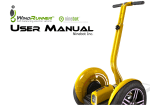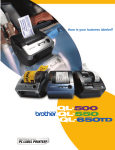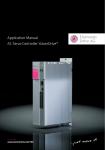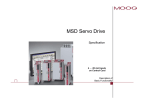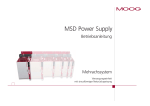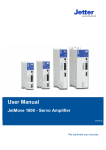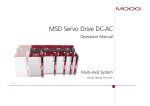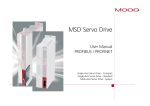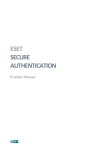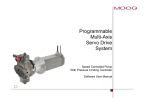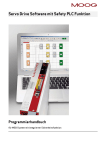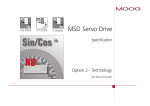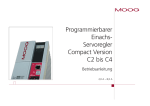Download MSD Servo Drive Specification - Functional Safety
Transcript
moog MSD Servo Drive Specification Functional Safety moog ID no.: CB38398-001 Date: 12/2013 MSD Servo Drive Specification – Functional Safety 2 Note: yy This document does not replace the MSD Servo Drive single-axis system operation manual (ID no.: CA65642-001), it merely supplements it. yy Please be sure to observe the information contained in the “For your safety”, “Intended use” and “Responsibility” sections of the aforementioned operation manuals. yy For information on installation, setup and commissioning, and details of the warranted technical characteristics of the MSD Servo Drive series, refer to the additional documentation (Operation Manual, User Manual, etc.). MSD Servo Drive Specification – Functional Safety Subject to technical change without notice. ID no.: CB38398-001 The content of our documentation was compiled with the greatest care and attention, and based on the latest information available to us. Date: 12/2013 Applicable as from firmware version: Development Phase – Revision 3 The German version is the original of this Operation Manual. We should nevertheless point out that this document cannot always be updated in line with ongoing technical developments in our products. Information and specifications may be subject to change at any time. For information on the latest version please visit [email protected]. Contents 1 2 3 5 Safety........................................................................................ 5 1.1 Intended use........................................................................................................5 1.2 Responsibility.......................................................................................................5 1.3 Maintenance........................................................................................................5 6 Diagnostics.............................................................................. 21 5.1 Status display on device.......................................................................................21 5.2 Status and error display in MDA5.........................................................................22 Functional safety..................................................................... 23 6.1 Danger analysis and risk assessment....................................................................23 6.2 Definition of terms...............................................................................................23 6.3 Function description.............................................................................................25 Supplements to the MSD Servo Drive Operation Manual............ 7 6.4 Validation.............................................................................................................26 2.1 6.5 Safety instructions................................................................................................26 Order code...........................................................................................................8 Electrical installation.................................................................. 9 7 Safe inputs/outputs................................................................. 27 3.1 Overview of connections, Size 1 to Size 4............................................................9 7.1 Specification of the safe MSD Servo Drive inputs.................................................27 3.2 MSD Servo Drive voltage supply...........................................................................11 7.2 Specification of the safe MSD Servo Drive outputs...............................................27 3.3 Electrical isolation method...................................................................................11 7.3 Specification of the safe brake driver output........................................................28 3.4 Connection of brake driver supply voltage (+24 V DC).........................................12 7.4 Circuitry examples................................................................................................30 3.5 Control connections.............................................................................................12 7.4.1 Input circuitry examples........................................................................30 3.5.1 Specification of control connections.....................................................12 7.4.2 Output circuitry examples.....................................................................32 3.5.2 Brake driver...........................................................................................13 7.4.3 Circuitry examples for brake driver output............................................35 3.6 Option 1..............................................................................................................14 3.7 Option 2..............................................................................................................14 3.8 Encoder connection.............................................................................................14 3.8.1 3.9 Safe encoder evaluation........................................................................14 Ready made SCC cable........................................................................................18 7.5 8 Response times....................................................................................................37 Appendix................................................................................. 39 8.1 Safety acceptance tests........................................................................................39 8.2 Declaration of conformity....................................................................................39 3.10 Braking resistor (RB).............................................................................................18 3.10.1 4 Protection in case of brake chopper fault..............................................18 Commissioning........................................................................ 19 moog ID no.: CB38398-001 Date: 12/2013 MSD Servo Drive Specification – Functional Safety 3 moog ID no.: CB38398-001 Date: 12/2013 MSD Servo Drive Specification – Functional Safety 4 1 1.1 Safety Intended use MSD Servo Drives are built-in units intended for installation in stationary electrical, industrial and commercial plant or machinery. When installed in machines the commissioning of the servo drive (i.e. start-up of intended operation) is prohibited, unless it has been ascertained that the machine fully complies with the Machinery Directive 2006/42/EC; compliance with EN 60204 is mandatory. Commissioning – i.e. putting the device to its intended use – is only permitted in compliance with the EMC Directive (2004/108/EC). The MSD Servo Drive conforms to the Machinery Directive 2006/42/EC. The servo drives conform to the requirements of the harmonised product standard EN 61800-5-1. If the servo drive is used for special applications (e.g. in areas subject to explosion hazard), the required standards and regulations (e.g. EN 50014, "General provisions" and EN 50018 "Flameproof housing") must always be observed. Repairs may only be carried out by authorised repair workshops. Unauthorised opening and incorrect intervention could lead to death, physical injury or material damage. The warranty provided by Moog would thereby be rendered void. 1.2 Responsibility Electronic devices are fundamentally not fail-safe. The company setting up and/or operating the machine or system is itself responsible for ensuring that the drive is rendered safe if the device fails. EN 60204-1/DIN VDE 0113 "Safety of machines", in the section on "Electrical equipment of machines", stipulates safety requirements for electrical controls. They are intended to protect personnel and machinery, and to maintain the function capability of the machine or system concerned, and must be observed. The function of an emergency stop system does not necessarily have to cut the power supply to the drive. To exclude the possibility of danger, it may be useful to set individual drives to a safe state using the safety functions programmable in the safety control. Execution of the safety functions is assessed by means of a risk analysis of the machine or plant, including the electrical equipment to EN ISO 14121, and is determined with selection of the circuit level/category in accordance with EN ISO 13849-1 "Safety of machines - Safety-related parts of controls". In addition, the user is obligated to validate all safety functions of the machine on completion of installation and programming. 1.3 Maintenance The MSD Servo Drives are maintenance-free. Opening the housing is not permitted, and doing so would result in voiding of any warranty. In the event of a defect or error, the servo drive must be returned to the manufacturer's Service department. NOTE: Deployment of the servo drives in non-stationary equipment is classed as nonstandard ambient conditions, and is permissible only by special agreement. NOTE: Cabinet mounting with IP54 protection is mandatory for use of the certified safety functions. moog ID no.: CB38398-001 Date: 12/2013 1 Safety MSD Servo Drive Specification – Functional Safety 5 1 moog ID no.: CB38398-001 Date: 12/2013 MSD Servo Drive Specification – Functional Safety 6 2 Supplements to the MSD Servo Drive Operation Manual As the function described in this specification (integrated safety control) is an option for the MSD Servo Drive system, it is supplementary to the operation manual. yy MSD Servo Drive Single-Axis System (ID no.: CA65642-001) MSD Servo Drive Single-Axis System Operation Manual Section Subject 1 Safety 2 Mechanical installation 3 Electrical installation 4 Commissioning 5 Diagnostics 6 Table 2.1 Safe Torque Off (STO) Specification New Supplemented Replaced 2.1 3.4, 3.9 3.8 3.1, 3.5 4 5.1 6 ff, 7 ff, A.1, A.2 6 MSD Servo Drive single-axis system supplements and replacements moog ID no.: CB38398-001 Date: 12/2013 2 Supplements MSD Servo Drive Specification – Functional Safety 7 2 Supplements moog 2.1 MSD Servo Drive Specification – Functional Safety ID no.: CB38398-001 Date: 12/2013 Order code The MSD Servo Drive variant with integrated safety control is coded as follows in the article designation. MOOG D-71034 Böblingen www .moog.com/industrial Made in Germany Model: : G392-006-001-001 S/N : D116605 Rev. A In: 230 V AC 3ph, 50/60 Hz 4,0 A Out: 0-230 V AC 3ph, 0-400 Hz 3,0 A G392 Rated current System voltage Option 1 (Communication) Year of production Option 2 (Technology) Option 3 (Safety) Week of production Option 4 (Function package) Special design ID : Figure 2.1 JJWWxxxxx MSD Servo Drive rating plate On rating plates of the MSD Servo Drive you will find the serial number, from which you can identify the date of manufacture based on the following key. You will find details of the rating plates' locations on the MSD Servo Drive in the MSD Servo Drive Operation Manual. Variants - - 8 3 Electrical installation 3.1 Overview of connections, Size 1 to Size 4 Top Supply for power electronics PE X11 INSERT The following shows the layout with the corresponding positions of plugs and terminals. To aid orientation, the connectors and terminals are labelled by abbreviations. MMC MultiMediaCard X1 Service interface USB 1.1 X2 Service interface Ethernet X3 X8 X7 X6 D1/D2 T1/T2 X1 Analog setpoint 1 Analog setpoint 2 GND STO STO GND X3 X4 X38 X39 X39 SW (Size 3+4) Control HW X12 Communication fieldbuses Layout, Size 1 to Size 4 (here: Size 1) moog ID no.: CB38398-001 Date: 12/2013 3 Electrical installation - ISD00 ISD01 ISD02 ISD03 ISD04 ISD05 ISA0+ ISA0ISA1+ ISA1- 24 V for control electronics (UV) + e.g. add. encoder 8 Encoder X4 X6 6 + 5 - 9 Front Resolver Output Safe crosscommunication Input X38 X39 + X40 - X13/ X20 +24 V OSSD04 OSSD05 GND X12 1 2 3 4 Motor brake actuation U V W LL+ Motore 3 ~ DC link Braking resistor RB Option 1 (+) X13 Brake (-) Bottom X40 Figure 3.1 + X8 Option 2 1 DGND 2 +24 V Option 1 SW (Size 1+2) 1 2 1 2 X10 X9 X7 3 4 5 6 7 8 9 10 11 12 13 GND SI0 14 ISSD00 15 ISSD01 16 GND SI1 17 ISSD02 18 ISSD03 19 GND SO 20 +24 V SO 21 OSSD00 22 OSSD01 23 OSSD02 24 OSSD03 X2 X38 D1, D2 T1, T2 MMC-Slot +24 V against E/A-GND X9/X10 (designationand termination technique vary according to size and device type; for detail see figures 3.3 to 5.5 and refer to the operation manual for teh device concerned ) Figure 3.2 Brake (+) Connection overview, Size 1 to Size 4 MSD Servo Drive Specification – Functional Safety 9 3 Electrical installation moog MSD Servo Drive Specification – Functional Safety ID no.: CB38398-001 Date: 12/2013 X11 L3 L2 L1 L3 L2 L1 FN K1 PE Figure 3.3 Connection of power supply for MSD Servo Drive single-axis system, 3-phase (Size 1-4) No. Designation Function Details D1, D2 7-segment display Device status display see p. 21 T1, T2 Pushbuttons Service functions see p. 21 Slot for MMC removable storage device Enables firmware download without PC for example see p. 9 X1 X2 USB 1.1 port Service interface, Plug & Play connection to PC see p. 9 X3 Ethernet port Service interface, fast TCP/IP port (RJ45) see p. 9 X4 Control terminals 6 digital inputs, 2 analog inputs, 4 safe digital inputs, 4 safe digital outputs see p. 12 Option 1 Communications Factory installed module for fieldbusses, e.g. sercos, PROFIBUS-DP, EtherCAT or CANopen see p. 14 X11 Connection for power supply Depending on device type and size: One- or three-phase AC mains supply or DC supply see p. 10 PE Protective conductor connection Connection diagram Figure 3.3 see p. 10 X9, X10 Connection of control supply UV 24 V supply voltage for control electronics of servo drive see p. 11 X8 Option 2 Technology Additional encoder interface (see X7) or safety evaluation of an external axis see p. 14 High-resolution encoder interface Sin/Cos encoder, EnDat 2.1 encoder, HIPERFACE® encoder see p. 14 X7 Table 3.1 Key to connection diagram, Size 1 to Size 4 No. Designation X6 Resolver connection Motor temperature monitoring can be routed through the resolver lead (X6/5 and 9) see p. 14 X38, X39 Connection of safe cross-communication Enables axle grouping of multiple MSD Servo Drive units in Safety variant see p. 9 X40 Connection of motor temperature monitor PTC, based on DIN 44082 Linear temperature encoder KTY84-130 Klixon automatic cut-out see p. 9 X13 (Size 1-4) Connection of motor brake Power output with open-circuit/overload detection to the relay. Attention: Pay attention to freewheeling suppressor circuit see p. 12 Power connection Motor, braking resistor and connection of DC link see p. 18 HW Hardware rating plate Contains serial number and electrical performance data see p. 8 SW Software rating plate Contains serial number, software version, MAC address see p. 9 X12 Table 3.1 Function 10 Key to connection diagram, Size 1 to Size 4 Details MSD Servo Drive voltage supply The control electronics, with its logic (µP), the encoder terminals and the inputs and outputs, are electrically isolated from the power section (power supply/DC-link). All control terminals are designed as safety extra-low voltage/protective extra-low voltage (SELV/PELV) circuits and must only be operated with such SELV/PELV voltages, as per the relevant specification. This provides reliable protection against electric shock on the control side. You therefore need a separate control supply, compliant with the requirements of a SELV/PELV. The opposite overview shows the potential supplies for the individual terminals in detail. This concept also delivers higher operational safety and reliability of the servo drive. ISD05 ILIM VµP 6 2 7 3 8 1 11 6 2 12 7 3 13 8 4 14 9 Encoder/SSI X7 VµP GNDµP X4/14 X40/ + Motor-PTC X40/ GNDµP ILIM A/D DGND X4/17 ILIM GNDµP X18 X4/14 UH X4/2 A/D F1 DGND GNDµP X4/13 DGND X4/1 SELV = Safety Extra Low Voltage PELV = Protective Extra Low Voltage X4/11 ISA00+ X4/12 ISA00X4/9 ISA01+ X4/10 ISA01- X9/+ UV F2 X9/- VµP GNDµP F3 µP's F4 GNDµP DGND OSSD00 VµP 5 X4/8 X15 ISSD03 Resolver X6 4 GNDµP DGND DGND ISSD00 GNDµP PE 1 X4/3 15 Electrical isolation method GNDµP ISD00 ISD01 ISD02 ISD03 ISD04 ISD05 10 3.3 Ethernet X3 9 The MSD Servo Drive must be supplied with +24 V ±20 % SELV/PELV via terminals X9 and X10. VµP USB1.1 X2 5 3.2 X10/+ 24 V DC control supply UV GNDµP X10/- X4/7 X13/1 X13/2 DGND OSD01 X13/3 X4/8 X13/4 DGND OSSD03 X4/9 F3 PE DGND Figure 3.4 moog ID no.: CB38398-001 Date: 12/2013 3 Electrical installation GNDµP RC DGND Complex, in part non-linear element imedance Polyswitch Electrical isolation method for Size 1 to Size 4 MSD Servo Drive Specification – Functional Safety 11 3 Electrical installation moog 3.4 Connection of brake driver supply voltage (+24 V DC) The brake driver for all sizes must be powered via an external voltage source. The maximum current capacity with the output active differs according to model size; for details refer to chapter 6. Size 1 - Size 4 Bottom X13 +24V OSSD06 GND +24 V DC (to spec.) - Connection of supply for brake driver, Size 1 to Size 4 Brake driver supply Terminal/Pin Table 3.2 Control connections 3.5.1 Specification of control connections Des. Term. Specification Specification UV = 24 V DC ±20 %, stabilised and smoothed. Specification of brake driver supply ATTENTION! Line protection Suitable measures must generally be applied to provide adequate line protection. The power supply to the safe brake driver output requires +24 V DC SELV/PELV. 12 Isolation Analog inputs X4/9 X4/10 X4/11 X4/12 yy UIN = ±10 V DC yy Resolution 12-bit; RIN approx. 101 kΩ yy Terminal scan cycle in "IP mode" 125 µs, otherwise 1 ms yy Tolerance: U ±1 % of measuring range end value No X4 Digital inputs next servo drive X13/1 = + X13/4 = - 3.5 ISA0+ ISA0ISA1+ ISA1- + OSSD05 Figure 3.5 MSD Servo Drive Specification – Functional Safety ID no.: CB38398-001 Date: 12/2013 ISD00 ISD01 ISD02 ISD03 ISD04 ISD05 X4/3 X4/4 X4/5 X4/6 X4/7 X4/8 Default input yy Frequency range < 500 Hz yy Scan cycle: 1 ms yy Switching level Low/High: ≤ 4.8 V / ≥ 18 V yy Imax at 24 V = 3 mA typ. OSSD03 24 12 ISA1OSSD02 23 11 ISA1+ Yes Safe digital inputs ISSD00 ISSD01 ISSD02 ISSD03 X4/14 X4/15 X4/17 X4/18 Default input yy Frequency range < 500 Hz yy Scan cycle: 1 ms yy Switching level Low/High: ≤ 5 V / ≥ 15 V yy Imax at 24 V = 3 mA typ. Safe digital outputs OSSD00 OSSD01 OSSD02 OSSD03 X4/21 X4/22 X4/23 X4/24 yy Rated operating voltage: 24 V (19.2 - 28.8 V) yy Max. Total current: 400 mA yy Max. Current per output: 100 mA Auxiliary voltage Table 3.3 Specification of control connections X4 Yes OSSD01 22 10 ISA0OSSD00 21 9 ISA0+ +24 V SO 20 8 ISD05 GND SO 19 7 ISD04 ISSD03 18 6 ISD03 ISSD02 17 5 ISD02 GND SI1 16 4 ISD01 ISSD01 15 3 ISD00 ISSD00 14 2 +24V GND SIO 13 1 DGND Des. +24 V Term. Specification X4/2 X4/14 yy Auxiliary supply to feed the digital control inputs yy UH = UV-∆U (∆U typically approx. 1.2 V), no destruction in case of short-circuit (+24 V -> GND), but device may briefly shut down. yy Imax = 80 mA (per pin) with self-resetting circuitbreaker (polyswitch) Isolation Table 3.3 X4/1 X4/13 Reference earth for +24 V, Imax = 80 mA (per pin) with self-resetting circuit breaker (polyswitch) Brake driver For models Size 1 to Size 4 connector X13 is provided for connection of one or two motor holding brakes acting on a common axis. Yes Des. +24 V OSSD04 OSSD05 GND Digital ground DGND 3.5.2 Terminal X13/1 X13/2 X13/3 X13/4 Specification yy yy Yes Connection Max. current to be driven dependent on module! For more details see chapter 6.3. X13 (Size 1-4) +24 V 1 OSSD04 2 M OSSD05 3 Specification of control connections X4 GND 4 - + +24 V (to spec) NOTE: Avoid ring currents With high currents flowing through the earth terminals a high resistance isolation from the device earth is required. This may under certain circumstances result in malfunction of the drive. To prevent this, avoid ring currents in the wiring. Table 3.4 Des. +24 V OSSD04 OSSD05 GND Specification of the terminal connection for a brake Terminal X13/1 X13/2 X13/3 X13/4 Specification yy yy Max. current to be driven dependent on module! For more details see chapter 6.3. Connection X13 (Size 1-4) +24 V 1 M OSSD04 2 OSSD05 3 M GND 4 - + +24 V (to spec) Table 3.5 moog ID no.: CB38398-001 Date: 12/2013 3 Electrical installation S pecification of the terminal connection for two brakes (precondition: acting on a common axis) MSD Servo Drive Specification – Functional Safety 13 3 Electrical installation moog 3.6 Option 1 Depending on the MSD Servo Drive variant, option 1 is factory-configured with various options. Fieldbus options such as EtherCAT or sercos are available. You will find all available options in the MSD Servo Drive Ordering Catalog. The user manuals for the respective options provide detailed information on commissioning. 3.7 MSD Servo Drive Specification – Functional Safety ID no.: CB38398-001 Date: 12/2013 Option 2 Option 2 can be factory-configured with various technology options. Additional or special encoders can be evaluated with it for example. It is also possible to evaluate encoder signals of an external axis in relation to safety. 3.8 Encoder connection 3.8.1 Safe encoder evaluation 14 Alongside drive and control evaluation of various encoder signals, the MSD Servo Drive also offers the facility to monitor the encoder signals with regard to functional safety. This internal diagnosis makes it possible to integrate the different safety monitoring functions (see chapter 6). When additionally using a monitoring encoder in the form of a redundancy, it is possible to increase the Performance Level (PL) and Safety Integrity Level (SIL) of the application, provided both encoder systems are acting on a common axis. The following matrix shows the possible encoder combinations: No. Process encoder 1 SinCos You will find all available options in the MSD Servo Drive Ordering Catalog. The user manuals for the respective options provide detailed information on commissioning. 2 SinCos 3 SinCos External axis monitoring Max. SIL 3 X1) SinCos 2) 3 2) 3 SinCos 5 SinCos HTL / count pulses 3 6 TTL TTL 2) 2 7 TTL HTL / count pulses 2 8 SSI SinCos 4) 10 SSI TTL 3/25) 4 9 1) 2) 3) 4) 5) Monitoring encoder SinCos 3 X1) 2) 3/25) SSI SinCos 11 SSI TTL 2) 3 12 SSI SSI 3) 3 13 SSI HTL / count pulses 3 14 Resolver Option 2 requires Safety Tech option for external axis monitoring (SinCos1) Option 2 requires Safety Tech option second safe axis monitor (SinCos) Option 2 requires Safety Tech option second safe axis monitor (SSI) Option 2 not required, both encoder signals in the same connector Relates to the maximum SIL of the external axis monitor. Table 3.6 Combinations of different safety monitoring functions 3 3 No. Process encoder 15 Resolver 1) 2) 3) 4) 5) Monitoring encoder 16 Resolver TTL 17 Resolver TTL 18 Resolver HTL / count pulses External axis monitoring Max. SIL X1) 3/25) X1) 3/25) 3 3 Option 2 requires Safety Tech option for external axis monitoring (SinCos1) Option 2 requires Safety Tech option second safe axis monitor (SinCos) Option 2 requires Safety Tech option second safe axis monitor (SSI) Option 2 not required, both encoder signals in the same connector Relates to the maximum SIL of the external axis monitor. Table 3.6 Combinations of different safety monitoring functions ATTENTION! Complete safety analysis Safety evaluation and monitoring of the individual encoder signals inside the controller is not always adequate. Non-certified encoder systems must be subjected to a complete safety analysis. In addition, the failure "Loosening of encoder fixation so that encoder no longer reports movement correctly" (safety standard EN 61800-5-2, annex D, table D.16) must be covered by excluding a shaft fracture in the case of single-channel systems, regardless of certification. NOTES: yy Safety analysis A safety analysis of non-certified encoder systems includes the following points: - Is the power of the sender LED controlled, and is end-of-life monitoring implemented? - Are Sin/Cos or TTL signals generated by signal processing and/or interpolator? - Are the systems for absolute position and incremental track independent? - For encoders containing complex ASICs or the like for signal conditioning or interpolation, the failure presumption is: "Wrong output signal due to ASIC malfunction", which cannot be excluded and cannot be diagnosed without using a second, independent encoder. - For encoders which use a "complex"protocol requiring a processor or an ASIC for processing in the encoder, the failure model for communications buses applies. yy Encoder cable: For connecting safe encoders, only approved encoder cable of maximum 30 m length may be used. yy Speed and signal frequencies The maximum values for speeds and signal frequencies specified in the tables must not be exceeded. yy Shutdown response time If a redundancy in the form of a monitoring encoder for the process encoder is used in an application, the resolution of the monitoring encoder determines the shutdown response time in the event of certain errors. Note: When using two encoders, the accuracy of the safe evaluation always relates to the encoder with the lower resolution. − Failure analysis and FMEA based on tables from annex D of safety standard EN 61800-5-2. − Analysis of the internal design of the encoder based on manufacturers' documentation. Key points of such an analysis may be: - Are sin and cos signals processed separately? - Can the encoder disk become detached from the shaft or slip? - Can the encoder be impaired by extraneous light? moog ID no.: CB38398-001 Date: 12/2013 3 Electrical installation MSD Servo Drive Specification – Functional Safety 15 3 Electrical installation moog MSD Servo Drive Specification – Functional Safety ID no.: CB38398-001 Date: 12/2013 Requirements for use of a resolver Feature Value Maximum evaluatable signal frequency 600 Hz Table 3.7 Maximum recordable speed 36000 rpm Speed calculation method Max. signal frequency / Number of pole pairs (p) * 60 Max. encoder cable length 30 m Transmission ratio 2:1 Max. phase shift (incl. cable) -30° to +30° Exciter amplitude 8 Vss (2.8 Vrms) Exciter frequency 8 kHz Max. excitation current 100 mA ss (35 mArms) Permissible number of pole pairs 1 to 5 appropriate overdimensioning! In addition, shaft fracture errors must be excluded by appropriate overdimensioning of the motor shaft! yy Fault exclusion The fault exclusion "Magnetic influence at the fitting location" as per the safety standard EN 61800-5-2, annex D, table D.16 must be taken into account in relation to third-party systems! yy Achievable safety The system is capable of attaining PL e as per EN ISO 13849-1 and SIL 3 as per EN 61508 /EN 62061 for evaluation of the resolver taking into consideration all the specified points. yy Areas of application The safety evaluation of resolvers is not dependent on specific motor types. Both synchronous and asynchronous motors can be used. Nor is it essential that the resolver should be integrated into the control circuit and/ or the commutation of the servo drive. And no specific resolver type or manufacturer is specified. The resolver used must, however, match the electrical specifications of the safety systems! The user is responsible for ensuring that the resolver used is suitable to attain the safety level required in the application and that all necessary measures are implemented to that end. Requirements for use of a resolver ATTENTION! Undetected errors in case of axis standstill In the event of axis standstill undetected errors may occur. To detect those errors, the resolver must be automatically rotated (by the application) by an angle of at least 360° (electrically) at a regularly recurring interval of a maximum of 24 h. NOTES: yy Observe tolerances The monitoring of the resolver signal is assigned a certain tolerance. Using non-conforming cable types, or lengthy encoder cables, or the use of different resolver types with differing specifications, may lead to unwanted error messages, as monitoring tolerances may be infringed as a result. So only the cable types and lengths approved by Moog may be used. yy Positive-locking/friction-locked connections When using a resolver, the rotor must be positive-locked with the motor shaft in order to exclude the error as mentioned at the beginning! The stator must likewise be positive-locked or friction-locked with the 16 Requirements when using a high-resolution encoder system Maximum evaluatable signal frequency TTL SinCos 400 kHz 400 kHz Speed calculation method Max. input frequency / Resolution (pulses per revolution) Signal level Digital signals EIA422 Table 3.8 Technical data of encoder inputs Analog signals 1 VSS ATTENTION! yy Errors at standstill Errors may occur in incremental encoders which are not detected at standstill. To be able to diagnose all errors, it is necessary to rotate the encoder at least one period in 24 hours. NOTES: yy Observe tolerances Incremental encoder signals are monitored, among others means, by monitoring of the pointer length, and is assigned a certain tolerance. This tolerance range extends from 55 % to 130 % of the specified signal level. yy Achievable safety The achievable safety integrity level depends on the encoder selection. In conjunction with a suitable encoder, encoder signal evaluation is capable of achieving PL e as per EN ISO 13849-1 and SIL 3 as per EN 61508/EN 62061. ATTENTION! Evaluation of speed and direction of rotation Count pulses can only be evaluated if the mechanical design includes two proximity switches which supply the signals with a 90° offset. Otherwise no evaluation of speed and direction of rotation is possible! NOTES: yy Safety analysis The use of HTL encoders or proximity switches requires a safety analysis of the installation, wiring and power supply! yy Achievable safety The additional use of count pulses to a process encoder might create the necessary redundancy to achieve PL e as per EN ISO 13849-1 and SIL 3 as per EN 61508/EN 62061. HTL encoders are treated like count pulses! Requirements for use of an HTL encoder or count pulses When using an HTL encoder or count pulses (e.g. with proximity switches), the signals are provided to the MSD Servo Drive for evaluation via the safe digital inputs (see also chapter 6). Owing to the low resolution of count pulses (HTL, initiators, among others), they may only be used as additional redundancy for high-resolution encoders and resolvers. This must comply with the following specifications: Feature Value Maximum evaluatable input frequency Speed calculation method Input level Table 3.9 200 kHz Max. input frequency / Resolution (pulses per revolution) +24 V DC as per EN 61131-2, type 1 Requirements for use of a resolver moog ID no.: CB38398-001 Date: 12/2013 3 Electrical installation MSD Servo Drive Specification – Functional Safety 17 3 Electrical installation moog 3.9 MSD Servo Drive Specification – Functional Safety ID no.: CB38398-001 Date: 12/2013 Ready made SCC cable 3.10 Braking resistor (RB) Safe axis cross-communication (SCC) is used to construct a group of up to six axes (MSD Servo Drive Safety). In such an axis group, all members are provided with all the data relevant for execution of the safety and monitoring functions within defined cycle times. Feature Temperature range CB72529-001 In regenerative operation, e.g. when braking the drive, the motor feeds energy back to the servo drive. This increases the voltage in the DC link. If the voltage exceeds a threshold value, the internal brake chopper transistor is activated (only available up to and including Size 4) and the regenerated power is converted into heat by way of a braking resistor. -10 ... +80 °C 3.10.1 Protection in case of brake chopper fault Cable diameter approx. 6 mm Maximum cable length per segment between servo drives 40 cm ATTENTION! Maximum total cable length (incl. connector) 2.8 m Overloaded brake chopper transistor Maximum number of cable segments Material of outer sheath Table 3.10 18 5 PVC Technical data of ready made SCC cable Note: SCC bus addresses are automatically configured only after power-on. If the internal brake chopper transistor is permanently switched on, because it is alloyed through by overload (= 0 Ω), there is a protective function to protect the device against overheating. This function is activated via Moog DriveAdministrator 5 by assigning any digital output (subject area "Inputs/outputs" -> "Digital outputs" -> OSSD00 to OSSD04) with "BC_FAIL(56)". In the event of a fault the selected output then switches from 24 V to 0 V. This signal ensures that the servo drive is safely disconnected from the mains supply. Detailed information on parameterisation can be found in the MSD Servo Drive User Manual. Figure 3.6 SCC cable 4 Commissioning As opposed to standard MSD Servo Drive units, MSD Servo Drive units with integrated safety control no longer feature the two inputs ENPO and ISDSH to enable the power stage and configure the STO safety function. To be able to configure the power stage, a program must be written and transferred using the operator control software Safety PLC Functions (for more details refer to the programming manual). By default, the MSD Servo Drive with integrated safety control incorporates a program by which the power stage can be configured by activating the safe digital inputs ISSD00 and ISSD01. This means commissioning of the drive section can be carried out as stipulated in accordance with the MSD Servo Drive Operation Manual independent of use of the operator control software Safety PLC Functions. Attention: If the above default program is overwritten by transferring a program from Safety PLC Functions, it cannot be restored by the "Reset to default" function! To enable configuration of the power stage again, a program must be transferred with the included safety module STO (for more details refer to the programming manual). moog ID no.: CB38398-001 Date: 12/2013 4 Commissioning MSD Servo Drive Specification – Functional Safety 19 4 Commissioning moog ID no.: CB38398-001 Date: 12/2013 MSD Servo Drive Specification – Functional Safety 20 5 Diagnostics Display (D1+D2) Mode ALARM 5.1 Status display on device Meaning Alarm state. Can be reset via digital input or reset mechanism within Moog Drive Administrator. Error state. Can only be reset by MSD Servo Drive 24 V reset. FAILURE In addition to the automatically displayed device states (see MSD Servo Drive Operation Manual), the MSD Servo Drive with integrated safety control features status information of the safety section. Press and hold down button T1 (for about 1s) to open the selection menu. When you press T1 repeatedly, or hold it down, the display shows "FS". When you then press button T2, following the letter sequence "S", "A", "F" and "E" the status of the safety section is indicated. This may include the following information: Display (D1+D2) Mode STARTUP SENDCONFIG STARTUP BUS RUN Meaning Synchronisation between the two processor systems and checking of the configuration/firmware data Table 5.1 Status and error display In the event of an alarm or error, following the letter "A" or "F" a 4-digit code sequence is displayed. A description of the error can be found by reference to the code in the error list contained in the programming manual. Note: If the code is 5-digit (read from the master), the first digit relates to the slave in the axis group. A slave itself only outputs 4-digit codes. Distribution of the configuration/firmware data and range check Initialisation of the bus system Normal system operation. All outputs are switched according to the current logic status. Stop mode to transfer the parameter and program data STOP Table 5.1 Status and error display moog ID no.: CB38398-001 Date: 12/2013 5 Diagnostics MSD Servo Drive Specification – Functional Safety 21 5 Diagnostics moog 5.2 ID no.: CB38398-001 Date: 12/2013 Status and error display in MDA5 When an alarm or error has occurred, a pop-up immediately appears with an indication in the "Cause" field as to whether it is an alarm or an error from the safety section. The "More information" field additionally shows a brief description and the code. Figure 5.1 Status and error display in MDA5 MSD Servo Drive Specification – Functional Safety 22 6 Functional safety 6.2 Definition of terms Safety functions 6.1 Danger analysis and risk assessment Users of the MSD Servo Drive integrated safety functions must comply with the latest applicable version of the Machinery Directive 2006/42/EC. The manufacturer or its representative is obliged to undertake a danger analysis (in accordance with the Machinery Directive 2006/42/EC) before the market launch of a machine. An analysis of hazards posed by the machine must be conducted and appropriate measures instigated to reduce/eliminate such hazards. With the danger analysis all prerequisites for establishing the required safety functions are fulfilled. The safety functions of the MSD Servo Drive with integrated safety control have been tested by the accredited certification body "TÜV Rheinland" (see appendix). The resultant acceptance is applicable to the servo drive types identified according to the order code (chapter 2.1). ATTENTION! The operator of the safety system must be trained such that his/her knowledge is appropriate to the complexity and safety integrity level of the safety system. This training includes the study of essential features of the production process and knowledge of the relationship between the safety system and the equipment under control (EUC). A safety function is a function executed by an E/E/PE (Electrical/Electronic/Programmable Electronic) safety system, a safety system implementing a different technology, or external risk reduction systems with the aim of attaining or maintaining a safe state for the EUC, taking into account a specific unwanted event. STO: Safety Torque Off yy The power supply to the motor is safely isolated by cutting the power to the drive. The axis then coasts to a stop. yy Attention: STO is the fallback solution for all safety functions! SS1: Safe Stop 1 yy The drive is braked by the action of the drive control, and in the process monitors the velocity characteristic or the time. When standstill has been reached or the time has elapsed, the STO function is activated. SS2: Safe Stop 2 yy The drive reduces the movement down to a stop, monitoring the velocity characteristic in the process. When standstill has been reached, the SOS function is activated. SOS: Safe Operating Stop yy Safe Operating Stop is the state in which the motor is held at standstill, whereby the drive in speed or position control mode. SLS: Safely Limited Speed yy The drive is monitored for compliance with a defined velocity limit (vmax). SLI: Safely Limited Increment yy The travel of the drive is monitored to a limit value for each driving job. This safety function enables a safe jog mode. SDI: Safe Direction yy moog ID no.: CB38398-001 Date: 12/2013 6 Functional safety Monitoring of the specified direction of rotation and movement of the axis. MSD Servo Drive Specification – Functional Safety 23 6 Functional safety moog SCA: Safe Cam yy If the motor speed or position is within a defined range, a safe signal is outputted. SEL: Safe Emergency Limit yy Monitoring of the permissible velocity referred to the relative distance from the maximum limit of the travel or positioning range. yy This safety function can replace the normal safety limit switches. SLP: Safely Limited Position yy Monitoring that the drive does not exceed a defined limit position. SBT: Safe Brake Test yy MSD Servo Drive Specification – Functional Safety ID no.: CB38398-001 Date: 12/2013 Safety function to check holding brakes subject to wear. Emergency stop In accordance with the national and European preface to EN 60204-1, electrical equipment may also be used for emergency stop devices provided they comply with relevant standards, such as EN 954-1 and/or IEC 61508. "STO" can thus be used for emergency stop functions. NOTE: The term "emergency stop device" has been replaced by the new term "action in case of emergency". The term "emergency stop" has been replaced by "shutdown in case of emergency (emergency stop)" – see paragraph 9.2.5.4.2 in EN 60204-1. 24 IEC 62061:2005 Safety sector standard for machinery, originating from IEC 61508 IEC 61508:1998-2010 International basic safety standard specifying the status of safety technology in all its aspects. EN 61800-5-1: 2007 Electrical drives with variable speed. Part 5-1: Requirements concerning electrical, thermal and function safety. EUC (Equipment under control) EUC system A system that responds to the input signals from the process and/or a user and generates output signals which enable the EUC to work as desired. EUC system Equipment, machine, apparatus or plant used for the manufacture, production and processing, transportation, medical or other activities. EUC risk Risk resulting from the EUC or its interaction with the EUC operating equipment. PFH (Probability of dangerous Failure per Hour) Probability of Failure per Hour, in respect of a hazardous random hardware failure. EN ISO 13849-1: 2008 Validation Safety of machines, safety related parts of controls. Affirmation that the special requirements for a certain purpose of use are fulfilled by investigation and the submission of objective proof. The EN ISO 13849 standard emerged from EN 954-1, supplemented by the aspects of quality management and reliability. Validation describes the activity to prove that the safety-related system under investigation meets the specified safety requirements of the safety-related system in every respect, before or after installation. Positive opening operation of a contact element yy Better EMC performance due to the all-over shielding of the motor cable Symbol for positive opening operation to EN 60947-5-1 annex K yy Shorter reaction times In a positive opening operation of a contact element, the contact separation is achieved as a direct result of a certain movement of the actuating element caused by non-elastic links (no springs). ATTENTION! Safety circuit A safety circuit is designed with two channels and has been approved by accredited testing bodies on the basis of the standards. There is a large number of manufacturers offering a vast variety of safety circuits for various applications. 6.3 By default, the safety function "STO" is enabled by the two safe digital inputs ISSD00 and ISSD01. It is possible to modify this configuration using the programming software for the integrated Safety PLC. Function description The safety control in the MSD Servo Drive is certified according to the requirements of EN ISO 13849-1 "PL e / Cat 4" and EN 61508 / EN 62061 "SIL CL 3". The safety function "STO" describes a safety measure in form of an interlocking and control function. Category 4 means that this safety function will remain in place in case of up to two faults. The STO function is the fallback solution for all other safety functions, as it ensures that no torque is outputted by the drive. Depending on the sensors used, the other safety functions can be used up to max. SIL 3 /PL e (Cat 3). Some errors are detected by the internal diagnostics in the inactive state or on the transition from the active to the inactive state of the safety function. To reduce the residual risk due to undetected errors, it is necessary to request the safety functions not automatically tested by a pulse pattern once within 24 hours. Otherwise the safety function may fail due to an accumulation of two or more undetected errors! The SIL achieved by the forced change of state of the application must be defined by the user. ATTENTION! The STO safety function is certified to SIL3, PLE (Cat 4). Accumulations of more than two errors may lead to failure of the safety function if no automatic testing of the actuation signals is implemented. It must be ensured that a shutdown is carried out by the user or the machine control at least once in 24 hours. The safety-related parts must be designed in such a way that: yy a single fault in any of the said parts does not result in loss of the safety function and yy the single fault is detected on or before the next request to the safety function. If this is not possible, a series of faults does not then lead to loss of the safety function. The integrated safety functions offer the following advantages over the conventional solution: yy No need for external motor contactors yy Less wiring yy Space-saving moog ID no.: CB38398-001 Date: 12/2013 6 Functional safety MSD Servo Drive Specification – Functional Safety 25 6 Functional safety moog 6.4 MSD Servo Drive Specification – Functional Safety ID no.: CB38398-001 Date: 12/2013 Validation Always draw up a validation plan. The plan stipulates the tests and analyses with which you determined the conformance of the solution (e.g. circuit suggestion) to the requirements from your application case. You should in any case check whether yy all safety related output signals are correctly and logically generated by the input signals yy the response in case of fault corresponds to the specified circuit categories. yy control and operating means are sufficiently dimensioned for all modes of operation and ambient conditions. After completion of analyses and tests create a validation report. This report should at least contain: yy all objects to be tested 6.5 26 Safety instructions DANGER FROM ELECTRICAL TENSION! yy When the servo drive is in the "STO" state all motor and mains cables, braking resistors and DC link voltage cables are carrying dangerous voltages against protective conductors. yy With the "STO" function no "shutdown of voltage in case of emergency" is possible without additional measures. There is no electrical isolation between the motor and the servo drive! This means there is a risk of electric shock or other electrical hazard. DANGER FROM ROTATING PARTS! yy If an exertion of external force is to be expected in the "STO" safety function, such as by a suspended load, this motion must be safely prevented by additional measures, such as by two brakes, safety bolts or a clamping device with brake. yy Short-circuits in two remote branches of the power section may activate a short-time axis movement depending on the number of poles of the motor. yy the personnel assigned to carry out testing yy test equipment (including details of calibration) and simulation instruments yy tests performed Example yy problems found and solutions to them yy results Synchronous motor: With a 6-pole synchronous motor the movement may be a maximum of 30°. For a directly driven ball screw, e.g. 20 mm per revolution, this corresponds to a one-time maximum linear movement of 1.67 mm. Document the results in a traceable manner. Safety instructions When carrying out the validation, observe the safety instructions contained in section 6.5. Example Asynchronous motor: The short-circuits in two offset branches of the power section have almost no effect, as the exciting field collapses when the inverter is disabled and has fully decayed after approximately 1 second. 7 Safe inputs/outputs The safe digital inputs are also capable of testing the test pulses generated by the MSD Servo Drive on the safe digital outputs (see section 7.2 "Specification of the safe MSD Servo Drive inputs"). With these test pulses, errors in the external wiring can be detected on the inputs, as only the associated parameterised pulse pattern is accepted. 7.1 Specification of the safe MSD Servo Drive inputs Each input can thus be configured individually for the following signal sources: The MSD Servo Drive has four safe digital inputs. They are suitable for connection of one or two channel signals with and without clocking and cross-connection testing. Used individually, they meet the requirements of SIL 2 / PL d; a group of two inputs meets the requirements of SIL 3 / PL e. Each of the four inputs is suitable for the connection of OSSD signals (output signal switching device), such as are used by various safe outputs for internal self-testing and shutdown testing for example. The MSD Servo Drive detects a High level on the respective input if the connected voltage is higher than 15 V and a Low level if the voltage is less than 5 V (as per EN 61131-2). An internal diagnostic function inside the unit cyclically checks the correct functioning of the inputs. The maximum transition time (the time during which the input voltage of an input is between the defined switching thresholds) may be 16ms. If one channel reads in a different input state than the other channel for longer than 16ms, an error message is generated and at the same time all outputs are disabled. NOTES: Outputs If no delay times are parameterised, all outputs and output functions (OSSD0x and STO) are switched off (Parameterisation of the delay times can be implemented as a de-escalation strategy for OSSD04, OSSD05 and STO). Note: yy Input assigned to pulse 1 yy Input assigned to pulse 2 yy Input assigned to pulse 3 yy Input assigned to pulse 4 yy Input assigned to DC 24 V continuous voltage It is also possible for inputs ISSD02 and ISSD03 to use two pulse encoders (e.g. proximity switches or the like) or an HTL encoder as count pulses for encoder evaluation. 7.2 Specification of the safe MSD Servo Drive outputs In addition to the safe signal inputs, the MSD Servo Drive has four safe outputs. Used individually, these outputs meet the requirements of SIL 2 / PL d; in groups of two outputs they meet the requirements of SIL 3 / PL e (see section 7.4.2"Output circuitry examples") The outputs can be used as safety outputs, with internal cyclic shut-off tests of the output driver switching the outputs to 0 V DC potential for a maximum test duration of 500 µs (OSSD). If the outputs are used as non-safety outputs, this internal test is not carried out, and no test pulses are outputted on the signals. If safe outputs are to be used by the servo drive as standard outputs, this must be programmed accordingly in the Safety PLC Function (see programming manual). In conjunction with the digital inputs, the outputs can also be used as signature outputs (test pulse) for error detection in the external wiring (see section 7.1"Specification of the safe MSD Servo Drive outputs"). In this case they act as switching 24 V DC outputs. Short-circuits, ground faults and cross-connections may lead to failure of the safety function, and must be prevented according to EN13849. moog ID no.: CB38398-001 Date: 12/2013 7 Safe I/Os MSD Servo Drive Specification – Functional Safety 27 7 Safe I/Os moog MSD Servo Drive Specification – Functional Safety ID no.: CB38398-001 Date: 12/2013 28 Observe maximum output current The High side driving outputs are implemented for a current of 100 mA per output. For higher current demand, the drivers of the brake output (High and Low side) or external relays can be used (digital outputs as per EN 61131-2). P4 Relay fallback voltage If relays are connected to the outputs, their fallback voltage must not be less than 5 V. P3 Supply The power supply to the safe outputs requires a SELV/PELV of +24 V DC. Output groups The grouping of two outputs to meet the requirements of SIL 3 / PL e is either OSSD00 and OSSD02 or OSSD01 and OSSD03. P2 P1 2 ms Figure 7.1 4 ms 6 ms 8 ms 10 ms 12 ms + Signatures For more details on use and programming of the signature outputs refer to the programming manual. The following circuit diagram describes the properties of the individual signatures over time: ATTENTION! If the system is operated in an axis group with multiple MSD Servo Drive units, an exclusion for short-circuits between the safe digital outputs of the various axes must be implemented. NOTES: Only monitoring function The signature outputs are specified only for monitoring of the digital inputs, and cannot be used for any other function in the application. In addition, the various signatures are specified exclusively for mechanical switching elements. Other switching elements may lead to signal corruption and so result in errors being generated. 7.3 Specification of the safe brake driver output In addition to the four safe digital outputs, the MSD Servo Drive has an additional safe digital output with high driver power output - the brake driver output. This output is two-channel, with High and Low side drivers, so that, in addition to holding brakes, contactors, deadlocks etc. can also be directly connected via two channels. If two brakes or two actuators are connected, they must act on the same safety function and act on a common axis in the application. To use the brake driver outputs, they must first be programmed on the Safety PLC Function in accordance with the programming manual. ATTENTION! NOTES: Minimum fallback voltage The fallback voltage of the brake(s) or actuator(s) used must not be less than 8 V. Observe maximum output current dependent on module MSD Servo Drive size Maximum holding current Connected brakes or actuators must not have a holding current less than 15 mA, as with a two-channel load circuit a reverse leakage current flows in the off state. Exclusion of short-circuits If the system is operated in an axis group with multiple MSD Servo Drive units, an exclusion for short-circuits between the brake driver outputs of the various axes must be implemented. Table 7.1 Maximum output current Size 1 2 x 1.4 A Size 2 2 x 2.1 A Size 3 2 x 2.45 A Size 4 2 x 2.45 A Maximum output currents dependent on module Capacitive loads As a general rule no capacitive loads, such as electronic contactors, are permitted on the brake driver outputs. Status not to master The status of the brake outputs is not transferred to the master. moog ID no.: CB38398-001 Date: 12/2013 7 Safe I/Os MSD Servo Drive Specification – Functional Safety 29 7 Safe I/Os moog 7.4 MSD Servo Drive Specification – Functional Safety ID no.: CB38398-001 Date: 12/2013 Circuitry examples 7.4.1 30 Input circuitry examples Attention: In the following circuitry examples it is assumed that the switching elements used are executed with safety approval in accordance with the intended PL as per EN ISO 13849-1 or SIL as per EN 61508 / EN 62061. When using the safe digital outputs, a short-circuit between two outputs of different axes must be excluded. The following points must additionally be noted: yy The safety regulations and EMC standards must be observed. yy With regard to the fault exclusions refer to the table in annex D to EN 13849-2. The examples presented in the following and their characteristic architecture are key to categorisation as per EN ISO 13849-1. The resulting maximum possible Performance Levels as per EN ISO 13849 are also dependent on the following factors with regard to the external components: yy Structure (single or redundant) yy Detection of common-cause failures (CCFs) yy Diagnostic coverage as required (DCavg) yy Mean time to dangerous failure of a channel (MTTFd) When using two inputs for one function, a discrepancy time of 3 seconds must be allowed. Example 1: Single-channel sensor without cross-connection test X4 ISSD03 ISSD02 ISSD01 ISSD00 OSSD03 OSSD02 OSSD01 *) OSSD00 **) +24 V DC GND *) With pulse pattern 1 Figure 7.2 **) With pulse pattern 2 Input circuitry example 1 The single-channel sensor is connected to an input of the MSD Servo Drive with no clocking. This is not advisable for safety applications, as the failure of the switching element would disable the safety function, a short-circuit between the supply and return conductors bridges the switching element and detection of a cross-connection is not possible. A maximum of PL b can be achieved. Example 2: Two-channel sensor without cross-connection test Example 3: Single-channel sensor with cross-connection test X4 X4 ISSD03 ISSD02 ISSD01 ISSD00 OSSD03 OSSD02 OSSD01 *) OSSD00 **) ISSD03 ISSD02 ISSD01 ISSD00 OSSD03 OSSD02 OSSD01 *) OSSD00 **) P1 +24 V DC P2 GND *) With pulse pattern 1 Figure 7.3 **) With pulse pattern 2 Input circuitry example 2 +24 V DC GND *) With pulse pattern 1 Use of two-channel homogeneous sensors without test pulses incorporates a redundant shut-off path, though a short-circuit between the supply and return conductors bridges the switching elements. Also, detection of a cross-connection is not possible. Safe operation can only be attained by means of isolated cable laying and exclusion of shorting on the terminals. This connection method is not advisable for use in safety applications outside of the cabinet. Taking into account the short-circuit and cross-connection fault exclusion (as per EN ISO 13849-1), PL e can be achieved. moog ID no.: CB38398-001 Date: 12/2013 7 Safe I/Os Figure 7.4 **) With pulse pattern 2 Input circuitry example 3 When using a single-channel sensor with clocking, short-circuits against 24 V DC and 0 V DC as well as cable breaks are detected. Cable shorts between the two connections of the sensor and the short-circuit between the input and clock output are not detected however. Failure of the switching element, resulting in loss of the safety function, is likewise not detected. Taking into account the short-circuit and cross-connection fault exclusion (as per EN ISO 13849-2 table D.8), PL d can be achieved, provided a suitable switching element with positive-opening contacts is used and the sensor is activated, and the safety function thereby requested, at regular intervals. MSD Servo Drive Specification – Functional Safety 31 7 Safe I/Os moog MSD Servo Drive Specification – Functional Safety ID no.: CB38398-001 Date: 12/2013 Example 4: Two-channel sensor with cross-connection test X4 7.4.2 32 Output circuitry examples Example 1: Static single-channel output ISSD03 ISSD02 ISSD01 ISSD00 OSSD03 OSSD02 OSSD01 *) OSSD00 **) X4 ISSD03 ISSD02 ISSD01 ISSD00 OSSD03 OSSD02 OSSD01 OSSD00 P1 P2 +24 V DC +24 V DC GND *) With pulse pattern 1 Figure 7.5 **) With pulse pattern 2 Input circuitry example 4 By using two independent clock signals on the homogeneous sensor all crossconnections and short-circuits can be detected. For safety application NC contacts are recommended, as only they are continuously tested with the test pulses. When using suitable switching elements with positive-opening contacts, PL e as per EN ISO 13849-1 is achieved. GND Figure 7.6 Output circuitry example 1 With single-channel switching outputs without external or internal testing, the MSD Servo Drive does not detect sticking of a connected contact. Shutdown is likewise not possible. This circuitry variant is not suitable for safety applications! Example 2: Dynamic single-channel output (OSSD) with plausibility check X4 Example 3: Static two-channel output of one group X4 ISSD03 ISSD02 ISSD01 ISSD00 OSSD03 OSSD02 OSSD01 OSSD00 ISSD03 ISSD02 ISSD01 ISSD00 OSSD03 OSSD02 OSSD01 *) OSSD00 +24 V DC GND +24 V DC Figure 7.8 GND *) With pulse pattern (alternatively also +24 V) Figure 7.7 Output circuitry example 2 As opposed to example 1 (figure 7.2), occurring faults are detected by internal diagnostics and plausibility checks of the switching element. Output circuitry example 3 As in example 1 (figure 7.2), in this case, too, fault detection and thus shutdown in the event of a fault is not possible without diagnosis. Suitable external measures as well as fault detection by the process can achieve PL d (as per EN ISO 13849-1), provided positive-opening contacts are used. It is not possible, however, to disable the switched function without positive-opening after sticking of one or more external contacts. This measure enables PL d as per EN ISO 13849-1 to be achieved. moog ID no.: CB38398-001 Date: 12/2013 7 Safe I/Os MSD Servo Drive Specification – Functional Safety 33 7 Safe I/Os moog MSD Servo Drive Specification – Functional Safety ID no.: CB38398-001 Date: 12/2013 Example 4: Static two-channel output of a different group X4 Example 5: Dynamic two-channel output (OSSD) of one group with plausibility check ~/= ISSD03 ISSD02 ISSD01 ISSD00 OSSD03 OSSD02 OSSD01 OSSD00 3/2 X4 ISSD03 ISSD02 ISSD01 ISSD00 OSSD03 *) OSSD02 *) OSSD01 OSSD00 **) +24 V DC X4 ENPO 10 RSH< 11 RSH> 12 ISDSH 22 GND Figure 7.9 34 3 Output circuitry example 4 If in this example the fault exclusion "short-circuit of an output to +24 V" or "crossconnection" can be made, by suitable external diagnostic measures as well as fault detection by the process, and using positive-opening contacts, it is possible to achieve PL e as per EN ISO 13849-1. NOTE: The same applies to a configuration on OSSD00 and OSSD02. M 3~ *) With pulse pattern **) With pulse pattern (alternatively also +24 V possible) Figure 7.10 Output circuitry example 5 This configuration represents an example of connection of the STO in the MSD Servo Drive and MSD Servo Drive Compact model series with the outputs of the MSD Servo Drive Safety variant. With this configuration all assumed faults are detected by the diagnostic process. As the internal architecture of the MSD Servo Drive safety outputs is based on category 2 however, the maximum possible achievable level is PL d as per EN ISO 13849-1. Example 6: Dynamic two-channel output (OSSD) of a different group with plausibility check X4 7.4.3 Circuitry examples for brake driver output ATTENTION! Using the brake outputs for two actuators or brakes not acting on the same safety function is not permissible for safety purposes! The High side driving output can be used functionally as an unsafe digital output. ISSD03 ISSD02 ISSD01 ISSD00 OSSD03 *) OSSD02 OSSD01 *) OSSD00 **) For unsafe use of the brake drivers, they must be programmed in accordance with the programming manual. Example 1: Two-channel connection of one brake X5 + - X12 +24 V DC **) With pulse pattern (alternatively also +24 V possible) Figure 7.11 Output circuitry example 6 By splitting the two outputs into different groups, category 4 is internally achieved. As a result, this configuration achieves PL e as per EN ISO 13849-1, provided the connected elements likewise meet the requirements of the safety category. moog Motor 3~ X13 (size 1-4) GND *) With pulse pattern U V W ID no.: CB38398-001 Date: 12/2013 7 Safe I/Os Pin 4: GND ext. Pin 3: OSSD05 Pin 2: OSSD04 Pin 1: +24 V ext. Brake (-) Brake (+ ) Figure 7.12 Brake driver circuitry example 1 Based on the internal architecture and the two-channel configuration of a suitable brake, PL e as per EN ISO 13849-1 is achieved. MSD Servo Drive Specification – Functional Safety 35 7 Safe I/Os moog MSD Servo Drive Specification – Functional Safety ID no.: CB38398-001 Date: 12/2013 Example 2: Two-channel connection of one actuator (contactor, deadlock etc.) 36 Example 3: Two-channel connection of two brakes acting on a common axis X13 (size 1-4) + X5 - Pin 4: GND ext. Pin 3: OSSD05 Pin 2: OSSD04 Pin 1: +24 V ext. U V W X12 Motor 3~ Figure 7.13 Brake driver circuitry example 2 Based on the internal architecture and the two-channel configuration of a suitable brake, PL e as per EN ISO 13849-1 is achieved. X13 (size 1-4) Pin 4: GND ext. Pin 3: OSSD05 Pin 2: OSSD04 Pin 1: +24 V ext. +24 V DC GND Figure 7.14 Brake driver circuitry example 3 In this example the brake driver provides two channels, each executed as single-channel with internal diagnostics. The redundancy, and two-channel configuration, of the overall system is achieved by using two brakes on one axis. Depending on whether the brakes have safety approval in accordance with the targeted Performance Level, PL e as per EN ISO 13849-1 can be achieved with this connection. Example 4: Two-channel connection of two actuators (contactor, deadlock etc.) acting on a safety function X13 (size 1-4) L1 L2 L3 Pin 4: GND ext. Pin 3: OSSD06 Pin 2: OSSD05 Pin 1: +24 V ext. 7.5 Response times The MSD Servo Drive with integrated safety control features two different response times. The standard cycle, in which the Safety PLC executable program is run, and a fast channel for rapid execution of key single safety functions. Standard cycle Function 1 axis I/O reactions Input M > STO M Response time to encoder error/ speed error +24 V DC GND Figure 7.15 Brake driver circuitry example 4 In this circuitry example, two series connected mains contactors are each switched by one driver output in order to switch the mains supply of a servo drive. The descriptions under example 3 apply here too. 1) ID no.: CB38398-001 Date: 12/2013 7 Safe I/Os 28 6 (14) 6 (14) Input M > STO S 52 6 (14) Input S > STO M 44 6 (14) Input M > STO S 68 6 (14) Input M > Output M 20 28 6 (14) 6 (14) Input M > Output S 52 6 (14) Input S > Output S 44 6 (14) Input S > Output M 68 6 (14) "Response time speed safety function shutdown output M" 24 "Response time speed safety function shutdown output S" 40 4 64 "Response time speed safety function shutdown STO M" 24 "Response time speed safety function shutdown STO S" 40 4 4 4 64 4 4 (with signature pulse on input) Table 7.2 moog 20 2-6 axes Fast channel 1) 1 axis 2-6 axes (FCi) (FCe) Response time to error in ms MSD Servo Drive Specification – Functional Safety 37 7 Safe I/Os moog ID no.: CB38398-001 Date: 12/2013 Note: The fast channel can only be used for safe shutdown, not to activate a safety function. MSD Servo Drive Specification – Functional Safety 38 Appendix A.2 Declaration of conformity As per Machinery Directive 2006/42/EC: A.1 Safety acceptance tests STO shutdown acceptance test Safety characteristics to EN ISO 13849: PL:..............................e Category:...................4 MTTFd:.......................416 DCavg = ......................92 % Safety characteristics to EN 62061 / EN 61508: SIL:.............................3 PFDAV (T1 = 20a) = 1.16 x 10^-4 PFH:............................1.34 x 10 -9 1/h moog Appendix ID no.: CB38398-001 Date: 12/2013 MSD Servo Drive Specification – Functional Safety 39 Appendix moog ID no.: CB38398-001 Date: 12/2013 MSD Servo Drive Specification – Functional Safety 40 Index F Fault exclusion............................................................................................................ 16 Functional safety........................................................................................................ 23 Function description................................................................................................... 25 A Appendix................................................................................................................... 39 B Brake driver................................................................................................................ 13 Braking resistor........................................................................................................... 18 C D Danger analysis and risk assessment........................................................................... Declaration of conformity.......................................................................................... Definition of terms...................................................................................................... Diagnostics................................................................................................................. 23 39 23 21 E Electrical installation.................................................................................................... 9 Electrical isolation method.......................................................................................... 11 Encoder connection.................................................................................................... 14 Index ID no........................................................................................................................... 2 Input circuitry examples............................................................................................. 30 Intended use................................................................................................................ 5 K Key to connection diagram, Size 1 to Size 4................................................................ 10 Circuitry examples..................................................................................................... 30 Commissioning........................................................................................................... 19 Connection of power supply....................................................................................... 10 Connection of supply voltage..................................................................................... 12 Connection overview, Size 1 to Size 4.......................................................................... 9 Control connections................................................................................................... 12 moog I ID no.: CB38398-001 Date: 12/2013 L Layout, Size 1 to Size 4 (here: Size 1)............................................................................ 9 M Maintenance................................................................................................................ 5 MSD Servo Drive voltage supply................................................................................. 11 O Option 1..................................................................................................................... Option 2..................................................................................................................... Order code.................................................................................................................. Overview of connections, Size 1 to Size 4.................................................................... 14 14 8 9 P Protection in case of brake chopper fault.................................................................... 18 MSD Servo Drive Specification – Functional Safety 41 Index moog ID no.: CB38398-001 Date: 12/2013 R Rating plate................................................................................................................. 8 Ready made SCC cable............................................................................................... 18 Requirements for use of a resolver.............................................................................. 16 Response times........................................................................................................... 37 Response time to error in ms...................................................................................... 37 Responsibility............................................................................................................... 5 S Safe encoder evaluation.............................................................................................. 14 Safe inputs/outputs.................................................................................................... 27 Safety.......................................................................................................................... 5 Safety analysis............................................................................................................ 15 Safety instructions...................................................................................................... 26 Safety monitoring functions........................................................................................ 14 Specification of control connections........................................................................... 12 Specification of the safe brake driver output............................................................... 28 Specification of the safe MSD Servo Drive inputs........................................................ 27 Specification of the safe MSD Servo Drive outputs...................................................... 27 Status and error display in MDA5................................................................................ 22 Status display on device.............................................................................................. 21 Supplements to the MSD Servo Drive Operation Manual............................................. 7 T Technical data of ready made SCC cable..................................................................... 18 U Usage.......................................................................................................................... 5 V Validation................................................................................................................... 26 MSD Servo Drive Specification – Functional Safety 42 moog ID no.: CB38398-001 Date:12/2013 MSD Servo Drive Specification – Functional Safety moog MSD Servo Drive Specification – Functional Safety ID no.: CB38398-001 Date:12/2013 TAKE A CLOSER LOOK. Moog solutions are only a click away. Visit our worldwide Web site for more information and the Moog facility nearest you. moog Moog GmbH Hanns-Klemm-Straße 28 D-71034 Böblingen Phone +49 7031 622 0 Telefax +49 7031 622 100 www.moog.com/industrial [email protected] Moog is a registered trademark of Moog, Inc. and its subsidiaries. All quoted trademarks are property of Moog, Inc. and its subsidiaries. All rights reserved. © 2013 Moog, Inc. Technical alterations reserved. The contents of our documentation have been compiled with greatest care and in compliance with our present status of information. Nevertheless we would like to point that this document cannot always be updated parallel to the technical further development of our products. Information and specifications may be changed at any time. For information on the latest version please refer to [email protected]. ID no.: CB38398-001, Rev. 1.0, 12/2013 Applicable from firmware version: Development Phase – Revision 3 The German version is the original of this Operation Manual.














































